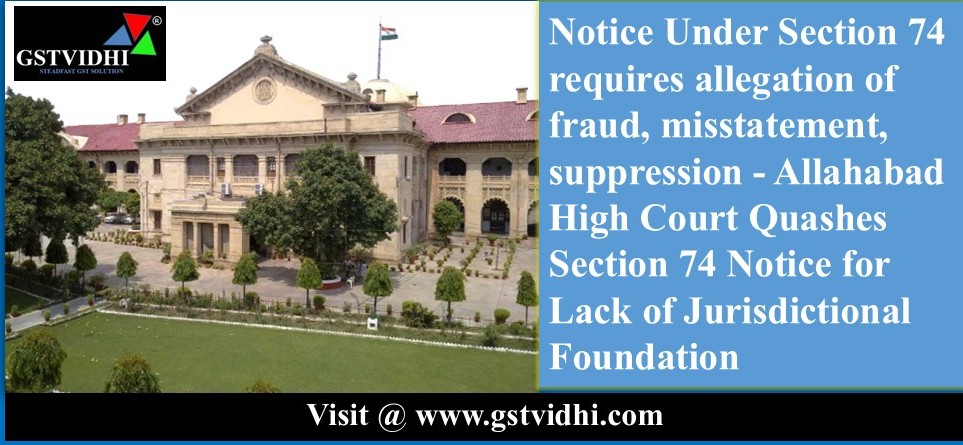
Penalty Under Section 130 of CGST Act - Section 130 proceedings
cannot be invoked merely for excess stock without evidence of intent to evade
tax—Allahabad HC
M/s Janta Machine Tools v. State of U.P. & Others (Writ Tax No. 1503 of 2024 | Order Dated: 22 May 2025 | High
Court of Judicature at Allahabad)
Summary of the Case
In
a significant ruling for businesses facing GST enforcement during routine
inspections and surveys, the Allahabad High Court quashed a demand of ₹14,58,811
raised against M/s Janta Machine Tools under Section 130 of the
CGST/UPGST Act. The demand had been initiated solely based on the finding
of excess stock during a departmental survey, without alleging fraud,
wilful misstatement, or intent to evade tax.
The
Court reiterated that mere existence of excess stock, without evidence of
unaccounted outward supply or suppressed turnover, cannot justify initiation
of proceedings under Section 130. It directed refund of the amount
deposited by the petitioner.
Background of the Case
1. Nature
of Business: M/s Janta Machine Tools is a registered
partnership firm dealing in the purchase and sale of machinery,
hardware, and machine parts, with GSTIN 09AAKFJ9517B1Z9 and business
premises located in Agra, U.P.
2. Survey
and Notice: On 4 May 2022, the GST department conducted a
survey/search at the petitioner’s premises. Based on the finding of excess
stock, the department initiated proceedings under Section 130 read with
Section 122 via notice dated 20 July 2022, raising:
o Proposed
tax demand: ₹7,17,560
o Equivalent
penalty: ₹7,17,560
o Confiscation
fine: ₹7,17,560
o Total
Proposed Demand: ₹21,52,680
3. Petitioner’s
Reply and Order: The petitioner submitted a detailed
reply on 27 July 2022, but the Adjudicating Authority passed a final
order on 26 September 2022, confirming the entire demand.
4. Appellate
Relief and Remaining Demand: On appeal, partial relief of ₹6,93,869
was granted, but the balance ₹14,58,811 (including tax, penalty, and
fine) was sustained.
5. Writ
Petition Filed: The petitioner approached the High Court
through Writ Tax No. 1503 of 2024, challenging both the original
adjudication order and the appellate order dated 16 May 2024.
Legal Issues for Consideration
1. Can
proceedings under Section 130 be validly initiated based only on
excess stock, without any evidence of unaccounted sales or intent to evade?
2. Should
the proper course for such discrepancies be assessment under Section
73 or 74, rather than confiscation and penalty under Section 130?
3. Are
the impugned orders sustainable in the absence of proper findings regarding
supply or evasion?
Petitioner’s Arguments
- Excess stock alone does not imply
evasion. The appropriate course, if any tax
liability was to be determined, should have been under Sections 73 or
74.
- The impugned orders lack legal
foundation because they invoked Section 130, which is penal and
confiscatory in nature, without meeting its statutory preconditions.
- The case is squarely covered by
binding precedents, particularly the judgment in S/s Dinesh Kumar
Pradeep Kumar v. Additional Commissioner (Writ Tax No. 1082 of 2022),
which was affirmed by the Supreme Court in SLP (C) Diary No.
5879/2025 on 17 April 2025.
Respondent’s Defense
- The department argued that excess
stock is a valid basis for initiating proceedings under Section 130,
which deals with confiscation and penalty where goods are liable to
seizure and tax is evaded.
- The orders passed were in
accordance with law and based on facts determined during the survey.
Court’s Analysis and Observations
1.
Key Finding: Section 130 Cannot Be Invoked for Mere Excess Stock
The
Court relied heavily on its earlier ruling in S/s Dinesh Kumar Pradeep Kumar
and M/s Metenere Limited, holding that:
“If
excess stock is found, proceedings under Section 73/74 of the GST Act should be
pressed in service and not proceedings under Section 130.”
2.
No Basis for Confiscation or Fraud Allegation
There
was no allegation or finding that the excess stock was linked to:
- Unaccounted outward supplies;
- Suppressed taxable turnover;
- Fraudulent intent or wilful
misstatement.
Hence,
Section 130, which requires intent to evade tax, was held not
applicable.
3.
Reference to Key Judgments
The
Court quoted extensively from:
- M/s Metenere Limited
— Section 35(6) read with Rule 56 requires unaccounted goods to be treated
as “deemed supply”, but tax liability must be determined via
Section 73 or 74.
- M/s Maa Mahamaya Alloys Pvt. Ltd.
— Similar facts; held that valuation based on excess stock alone is
invalid under Section 130.
“Penalty
under Section 130 requires proof of intent to evade… absence of which renders
such proceedings unsustainable.”
Final Judgment and Relief
1. Impugned
Orders Quashed
o The
order passed by the adjudicating authority dated 26 September 2022, and
o The
appellate order dated 16 May 2024
were quashed in entirety.
2. Writ
Petition Allowed: The writ petition was allowed.
3. Refund
Ordered: Any amount deposited by the petitioner in compliance
with the impugned orders shall be refunded as per law.
Conclusion:
This
judgment is a critical addition to the evolving jurisprudence around GST
enforcement powers, especially:
- The misuse of Section 130
during surveys;
- The importance of establishing
mens rea (guilty mind) for penal provisions;
- Protecting businesses from arbitrary
confiscation and penalty orders in absence of clear tax liability.
It
also provides clarity to assessing officers that mere discrepancies or stock
variation cannot justify draconian enforcement without proper tax
determination first.
Disclaimer: All the Information is based on the notification, circular and order issued by the Govt. authority and judgement delivered by the court or the authority information is strictly for educational purposes and on the basis of our best understanding of laws & not binding on anyone.
Press On Click Here To Download File
Click here